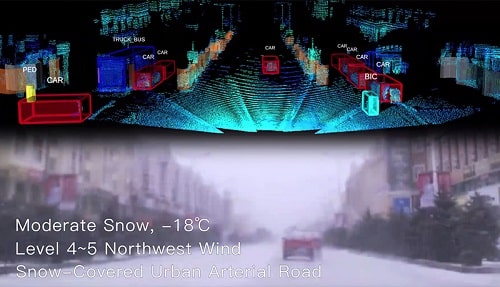The sensor adapts to all weather conditions for intelligent vehicles and proves reliable perception performance under low-visibility

RoboSense has released a sensing performance test video of the automotive-grade solid-state LiDAR RS-LiDAR-M1 (the SOP version) under extremely challenging snowy cold weather (-18 degrees Celsius to -23 degrees Celsius), performing the first cold winter test of automotive-grade solid-state LiDAR.
The RS-LiDAR-M1 was mounted and tested on a passenger car and L3 heavy-duty freight truck in snow-covered urban streets and arterial roads, and other outdoor snow-covered roads on sunny days.
The SOP version of self-driving MEMS solid-state RS-LiDAR-M1 adapts to all weather conditions for intelligent vehicles. The snowy and cold winter test results prove that the SOP version of sensing scanner RS-LiDAR-M1 has reliable perception performance, with clear and stable point cloud output under low-visibility moderate snow and low-temperature (-23 degree) weather in various road scenes.
RoboSense has adopted VDA6.3 as the basis of project management and control, fully implemented the requirements of the IATF16949 quality management system and ISO26262 standard, and has integrated ISO16750 and other automotive-grade reliability specifications, to carry out a series of verification tests on M1, including:
- random mechanical vibration
- mechanical shock
- splash water
- stone impact
- high and low-temperature storage and operation
- solar radiation
- EMC
- chemical corrosion
- salt spray and others
The cumulative test time of all M1 test samples has exceeded 300,000 hours, the longest-running prototype has been in continuous operation for more than 700 days, and the total road test mileage has exceeded 200,000 kilometres.
RoboSense would start mass production and delivery of the automotive-grade solid-state LiDAR RS-LiDAR-M1 for contract projects in Q2 this year.






